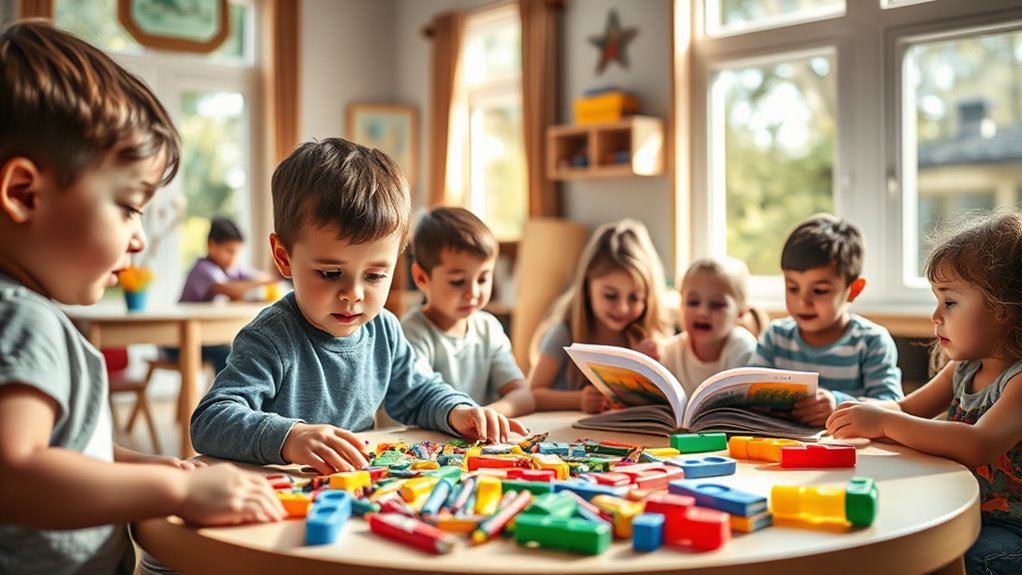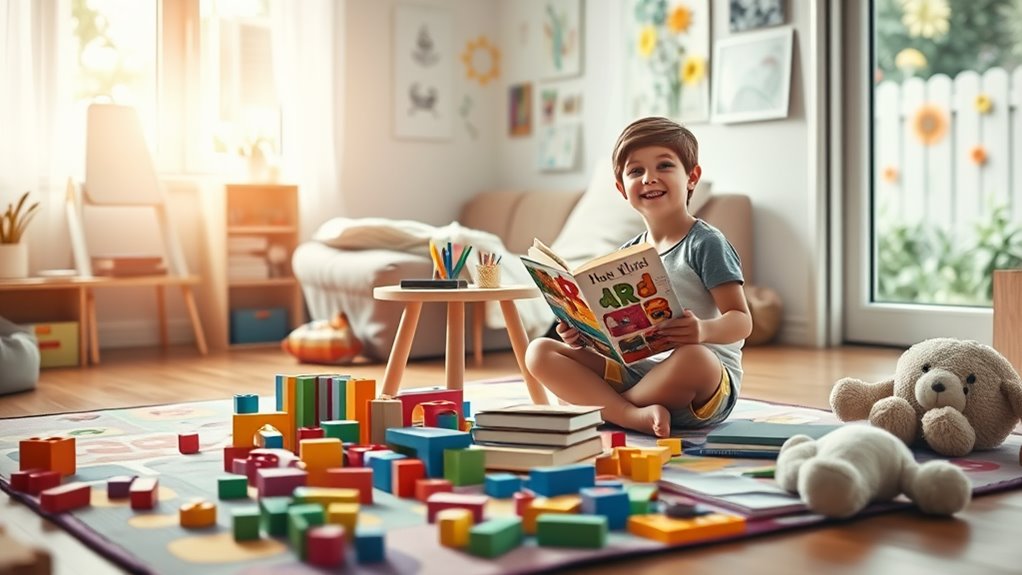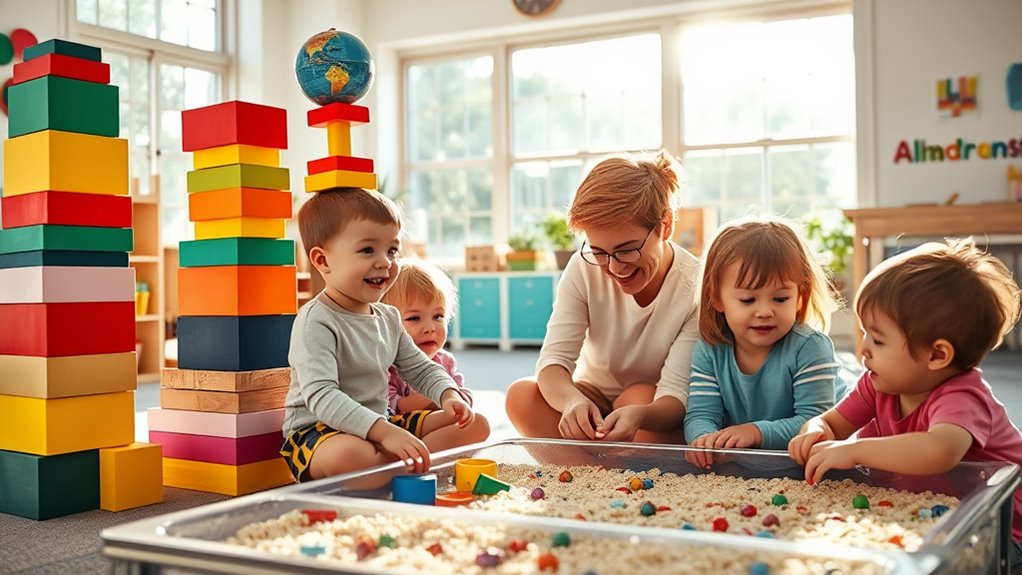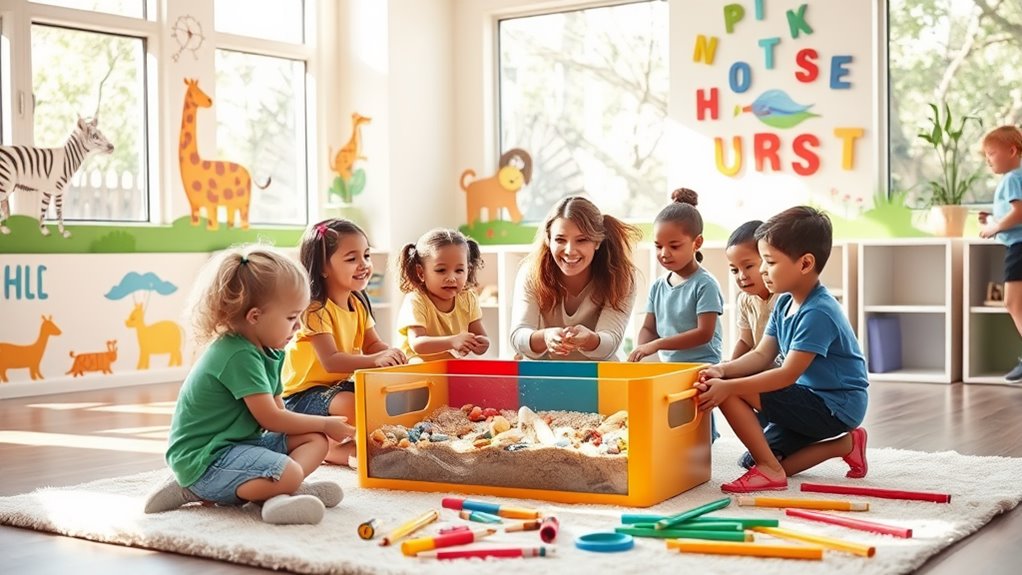5 Ways Early Childhood Education Could Save Your Child’s Future
Investing in early childhood education can truly save your child’s future. It enhances cognitive development, helping them think critically and solve problems. They’ll also foster essential social skills, boosting their confidence in interacting with peers. Early education builds emotional resilience, equipping them with coping strategies for life’s challenges. Plus, it promotes long-term academic success by nurturing a love for learning and effective study habits. Lastly, it encourages lifelong learning, sparking curiosity and independent thinking. Each of these aspects lays a strong foundation for a successful life, so keep exploring how you can support your child’s journey!
Key Takeaways
- Fosters critical thinking and problem-solving skills, laying a strong cognitive foundation for future academic success.
- Builds essential social skills, enhancing communication and collaboration for thriving relationships later in life.
- Cultivates emotional resilience, equipping children with strategies to manage stress and overcome challenges effectively.
- Encourages a love for learning, instilling motivation and effective study habits that support long-term academic achievement.
- Promotes lifelong curiosity and independent critical thinking, preparing children for ongoing intellectual growth and adaptability in a changing world.
Enhances Cognitive Development
Early childhood education plays a crucial role in enhancing cognitive development, and it’s not just about learning the basics. It lays the foundation for skills that will serve your child throughout their life. During these formative years, children engage in activities that promote critical thinking and problem solving, essential tools for navigating the complexities of the world.
By participating in hands-on learning experiences, your child learns to analyze situations, ask questions, and explore various solutions. This approach fosters an environment where they can experiment, make mistakes, and learn from them, crucial for developing resilience and adaptability. For instance, when faced with a challenge in a group activity, they’ll practice evaluating different strategies, which builds their confidence in decision-making.
Moreover, early exposure to puzzles, games, and interactive storytelling encourages your child to think creatively and strategically. These activities stimulate brain development and enhance their ability to process information, leading to improved academic performance later on.
Ultimately, investing in early childhood education means giving your child the tools to think critically and solve problems effectively, setting them up for success in school and beyond.
Fosters Social Skills
A strong foundation in social skills is vital for your child’s overall development, and early childhood education plays a key role in this area. Through structured activities and guided play, your child engages in peer interaction, learning how to communicate effectively with others. These experiences are crucial, as they teach children to express their thoughts and feelings, understand different perspectives, and collaborate with their classmates.
In early childhood settings, children encounter diverse social situations that help them develop essential communication skills. Whether they’re sharing toys or working together on a project, these interactions foster a sense of community and belonging. You’ll notice your child becoming more adept at resolving conflicts, negotiating, and empathizing with peers, all of which are critical skills for their future.
Moreover, as your child navigates these social landscapes, they build confidence in their ability to connect with others. This confidence will serve them well in later stages of life, whether in school, at work, or in personal relationships. By investing in early childhood education, you’re not just nurturing academic growth; you’re equipping your child with the social tools they’ll need to thrive in an increasingly interconnected world.
Builds Emotional Resilience
Many parents may not realize how early childhood education can significantly contribute to building emotional resilience in children. In a nurturing educational environment, kids learn to navigate their emotions and develop essential skills for emotional regulation. These foundational experiences enable them to understand their feelings better, fostering a sense of self-awareness that’s crucial for coping with life’s challenges.
Through structured play and guided interactions, children encounter various social situations that teach them to manage their emotional responses. They learn to identify feelings like frustration or disappointment and practice coping strategies, such as taking deep breaths or seeking help from a teacher. This hands-on approach creates a safe space for experimentation, allowing your child to fail and succeed in a supportive setting.
As your child hones these skills, they cultivate a toolbox of strategies to tackle future stressors, fostering a lifelong ability to bounce back from adversity. By prioritizing early childhood education, you’re not just preparing your child academically; you’re equipping them with the emotional resilience necessary for a successful and fulfilling life. Investing in this crucial stage means investing in their ability to thrive, no matter what challenges they face down the road.
Promotes Long-Term Academic Success
Building emotional resilience lays a solid foundation for long-term academic success. When your child experiences early childhood education, they develop vital skills that directly influence their academic journey. By fostering a love for learning, this education promotes academic motivation, encouraging your child to engage with their studies enthusiastically.
As your child learns to navigate challenges and setbacks, they’ll cultivate effective study habits that serve them throughout their educational career. Early childhood education emphasizes the importance of routines, setting the stage for disciplined learning. These routines help your child understand the value of consistency, making it easier for them to form strong study habits as they progress through school.
Moreover, when children are taught to manage their emotions and approach learning with curiosity, they’re more likely to take initiative in their education. This proactive attitude often leads to deeper understanding and retention of material, further solidifying their academic foundation.
Investing in early childhood education isn’t just about immediate benefits; it’s about equipping your child with the tools they need for future success. By nurturing emotional resilience, you’re helping them pave the way for a lifetime of academic achievement.
Encourages Lifelong Learning
Fostering a love for learning during early childhood sets the stage for lifelong curiosity and intellectual growth. When you invest in your child’s early education, you’re not just teaching them facts; you’re nurturing their curiosity development and critical thinking skills. Here are a few ways early childhood education encourages this essential mindset:
- Interactive Learning: Engaging activities spark questions and exploration, allowing children to investigate the world around them.
- Problem-Solving Opportunities: By presenting challenges, you help your child learn to think critically and develop solutions independently.
- Encouragement of Questions: An environment where curiosity is welcomed fosters a habit of inquiry, leading to deeper understanding and retention of knowledge.
- Diverse Perspectives: Exposure to different viewpoints promotes open-mindedness and enhances critical thinking, encouraging children to evaluate information critically.
In nurturing these qualities early on, you equip your child with the tools needed for lifelong learning. They’ll approach new experiences with enthusiasm, ready to adapt and grow. This foundation not only supports academic pursuits but also enriches their personal and professional lives in the future.
Frequently Asked Questions
How Can Parents Support Early Childhood Education at Home?
You can support early childhood education at home by engaging in fun learning activities and showing consistent parental involvement. Create a routine that encourages exploration, reading, and play, fostering a love for learning in your child.
What Age Is Ideal to Start Early Childhood Education?
The ideal age to start early childhood education is around three years old. By then, your child typically meets key developmental milestones, ensuring preschool readiness and fostering essential social, emotional, and cognitive skills for future success.
Are There Specific Teaching Methods for Early Childhood Education?
Yes, there are specific teaching methods for early childhood education. You might explore play-based learning, which encourages exploration, and Montessori methods, fostering independence. Both approaches nurture creativity and problem-solving skills essential for your child’s development.
How Does Early Childhood Education Impact Future Job Opportunities?
Imagine a sturdy tree rooted in rich soil; that’s how early childhood education nurtures skills development. It cultivates critical thinking and creativity, enhancing career readiness and opening doors to diverse job opportunities throughout your child’s future.
What Are the Signs of Effective Early Childhood Education Programs?
To identify effective early childhood education programs, look for quality indicators like well-structured curriculum assessments, dedicated staff, engaging learning environments, and strong family involvement. These elements foster growth and prepare children for future success.




